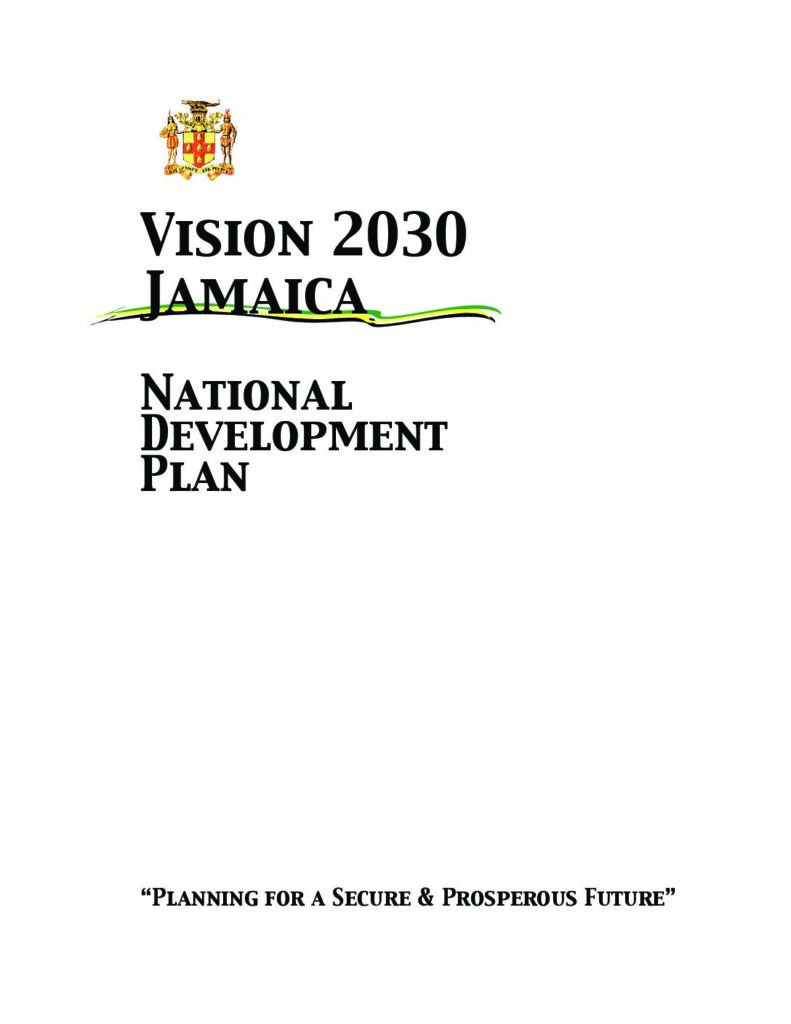This Plan has been produced in the midst of a global financial and economic crisis that is the most serious since the Great Depression of October 1929. While
Jamaica has to respond to short-term emergencies, it cannot lose sight of the
strategic and long-term requirements for development. We must continue to plan,
even though we operate in a dynamic global context, and deal with the
consequences while we grasp the opportunities to prosper.
Many social and economic problems preexist the current crisis. Partly due to
our neglect of long-term issues, our nation has suffered from a number of
inadequacies since achieving Independence in 1962 which has led to:
poor GDP growth performance, high levels of debt, unacceptable levels of
unemployment and poverty, crime and violence, low levels of skills, weak
infrastructure, and uncompetitive industries that produce low value
commodities.
This weak national performance has been exacerbated by very rapid urbanization, migration and globalization which have had a negative impact on the structure and stability of the Jamaican family. The result has been a weakening of social capital and the emergence of negative social values and mindset that we must overcome if the society is to advance rapidly. Jamaicans have expressed a clear wish to break out of this vicious cycle of low performance and build a quality society.
In response to this wish, the Planning Institute of Jamaica (PIOJ) was mandated by Government to guide the process of preparing a long term national development plan to enable Jamaica to achieve developed country status by 2030.
Previous planning efforts floundered, partly because they were perceived as
being owned only by the Government of the day. This Plan is therefore, broadbased
in scope, non-partisan and inclusive, the recipient of input from the
public and private sectors, Trade Unions, NGOs, external agencies and ordinary
citizens. The final product is a National Development Plan which captures the
very diverse needs and aspirations of our people.
This yearning for a secure and prosperous future is encapsulated in the
vision statement: “Jamaica the place of choice to live, work, raise families,
and do business”. This vision embodies the clear message that emerged from the
inclusive planning process.
This reveals that that hopes and dreams of our people transcend mere growth in
per capita income, although this is considered a worthy goal.
Important issues that emerged during the consultation phase were for: greater
access and opportunities; efficient delivery of health, education, justice and security services; a more inclusive society which fosters a greater sense of hope, particularly the young; greater development of rural areas; protection of the environment; and a strong desire to preserve the positive and transformational aspects of our culture and heritage.
By 2030, we see Jamaica as a country having a vibrant and sustainable
economy, society and environment; a high level of human capital development;
greater opportunities and access to these opportunities for the population;
and a high level of human security. Developed country status for Jamaica is,
therefore, a definition crafted from our realities and aspirations and against
which we will measure our achievements and successes.
Vision 2030 Jamaica is the strategic guide or roadmap to achieve this level of
development. Through short- and medium-term priorities, policies and
programmes which are captured in the Medium Term Socio-Economic Policy
Framework (MTF), the Plan provides dynamism and flexibility. This framework
for implementation facilitates consistent monitoring and evaluation and allows
domestic as well as global changes to be reflected and incorporated in the
planning process.
We will not achieve developed country status overnight; the change will be
gradual. To achieve this goal requires leadership, partnership, national will and
commitment for transformation, a sense of urgency about the unsustainable
nature of the current path, and a passionate desire to achieve greatness.
Today, our children, from the tiny boy in Aboukir, St. Ann, to the teenage girl in Cave, Westmoreland, have access to technologies that were once considered
science fiction. They seek opportunities to realise their full potential. This Plan is to ensure that, as a society, we do not fail them.
We have a duty to ourselves, to the sacrifices of past generations and to the
hopes of future generations, to preserve the best of our country and to
transform the worst. The outcome in 2030 is dependent on the decisions we
make today.
I invite all Jamaicans, as well as our global partners, to join in the next stage of this exciting journey: the successful Plan
implementation of Vision 2030 Jamaica.
Wesley Hughes, CD, PhD
Director General
Planning Institute of Jamaica
“Jamaica, the place of choice to live, work, raise families and do business”.


